Don't wanna be here? Send us removal request.
Text
How Does an Accountability Transform Your Goals Into Growth
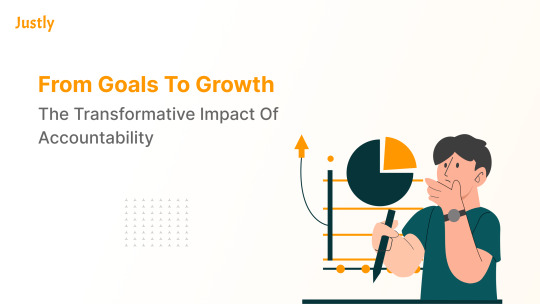
Have you ever thought about what it takes to turn your dreams into reality?
It's like going on a big adventure, isn't it?
You set goals, work hard, and watch yourself grow along the way. But here's the thing: the journey isn't always easy. It's full of ups and downs, twists and turns.
The Power of Goals
Goals are important for guiding and focusing our efforts in various aspects of life, such as career, skills, and personal growth.
Setting goals has psychological benefits, including providing motivation, sharpening focus, and instilling a sense of purpose.
Defining a goal initiates a journey of self-discovery and determination.
Challenges like lack of motivation, unclear objectives, and unforeseen obstacles can hinder progress in achieving goals.
Recognizing and overcoming these challenges are essential parts of the goal-setting process.
The Transformative Impacts of Accountability
Accountability can have several transformative impacts on individuals, teams, and organizations.
Here are some key transformative impacts of accountability.
Accountability leads to increased productivity and effectiveness.
It helps people keep learning all the time by thinking about what they've done, learning from their mistakes, and trying to get better.
It builds trust within teams and organizations by encouraging individuals to take ownership of their work and decisions.
Empowerment to address challenges and find solutions.
It aligns individuals and teams with organizational goals and values
It encourages a proactive approach to problem-solving, with accountable individuals and team collaboration.
Accountability isn't just a buzzword; it's a catalyst for growth. From boosting productivity to fostering trust and empowerment, its transformative impacts are undeniable.
So, Let’s delve deeper into how accountability can propel your goals toward growth on Justly.
0 notes
Text
Best Practices for Running
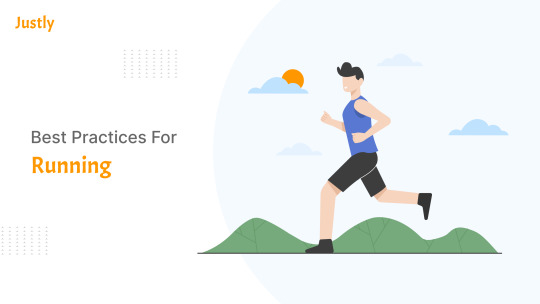
Have you decided to start running regularly as a useful exercise routine for your physical fitness or weight loss?
Let's explore how to turn those initial steps into a journey filled with joy and accomplishment.
Running is a beneficial activity that can give your body the perfect aerobic or cardiovascular workout. But you should not just run, you have to do it right and do it safely.
Here are a few helpful tips that'll help you get started if you're not experienced and a beginner for running.
Start Slow — When running, it is important to begin at a slow and manageable pace to allow your body to adapt and reduce the risk of injuries.
Always warm up with gentle aerobic workouts and dynamic stretches before running to increase blood flow to your muscles and prepare your body for physical activity.
Choosing the proper running shoes is crucial for avoiding injuries, ensuring comfort, and improving running efficiency.
Stay hydrated before, during, and after your run, and consume a balanced diet rich in carbohydrates, proteins, and healthy fats to fuel your body optimally and support recovery.
Running is not just a physical challenge but also a mental one. Cultivate mental resilience by focusing on positive thoughts, setting realistic goals, and practicing mindfulness during your runs.
Start with a basic running or walking routine and gradually increase the duration, frequency, and distance as your body adapts.
Tips for Maintaining Motivation in Running
Setting fitness goals maintains motivation, especially when interest declines.
Running with a partner, in-person or through apps, enhances enjoyment and accountability.
Apps like Justly assist in setting and monitoring fitness goals.
Specific challenges, like time or distance goals, keep motivation high.
Tracking progress with apps like Justly or Pedometers boosts motivation, especially after achieving personal bests.
Incorporating these fundamental tips into your running routine can make a significant difference, especially if you're just starting.
These practices lay a solid foundation for your running journey. For more insights and motivation on how to enhance your running experience, dive into our full article on Justly Blog.
#running tips#productivitytips#habits#life#growth#goals#blog#motivation#motivational#health & fitness#focus
6 notes
·
View notes
Text
How To Cultivate Focus and Clarity in a Distracted World

We live in a distracted world where focusing on ONE thing at a time has become hard or even impossible for us.
Research shows that when we get distracted, it takes us an average of 23 minutes to focus on our previous task again.
But how can we NOT be distracted?
Distraction is a common challenge in today's fast-paced world filled with various stimuli.
However, habits such as poor sleep, excessive screen time, multitasking, lack of physical activity, and high-stress levels can impact your ability to focus.
How To Cultivate Focus and Clarity In Distracted World
Cultivating focus and clarity in a distracted world requires intentional practices and mindful strategies.
Let's explore some effective ways to achieve this.
Mindfulness meditation: Set aside a few minutes each day to focus on your breath and allow thoughts to come and go without judgment.
Time blocking: Allocate specific blocks of time for different activities, including focused work, breaks, and designated periods for emails or meetings.
Digital detox: Schedule regular periods to disconnect from electronic devices and engage in screen-free activities.
Establish clear goals: Set clear and achievable goals for the day or week, breaking them down into smaller tasks for clarity and direction.
Physical exercise: Regular physical activity improves focus and cognitive function, so incorporate exercise into your routine.
Set a daily priority: Write down what you want to accomplish each day, ideally the night before, and identify a single priority to commit to.
In a world filled with distractions, cultivating focus and clarity is essential for productivity and well-being.
We have discussed various strategies to help you sharpen your focus and help you to keep on track.
So, dive deeper into these strategies and discover more insights on how to navigate distractions effectively by visiting Justly Blog.
0 notes
Text
How to Find Gratitude and Cultivate Thankfulness
Gratitude is a positive emotion that involves being thankful and appreciative and is associated with several mental and physical health benefits.
It is one of these feelings when you are grateful, you react with kindness, warmth, and other expressions of generosity because you are appreciative of something or someone in your life.
Benefits of Gratitude
Gratitude can transform common days into thanksgivings, turn routine jobs into joy, and change ordinary opportunities into blessings.
Improves Mental health
Enhances Emotional Well-being
Improves Sleep Quality
Positively impacts physical health
Enhances self-esteem
Practical Techniques for Finding Gratitude
Cultivating gratitude involves adopting practical techniques that can become a part of your daily routine.
Gratitude journaling involves writing down three things you are grateful for each day, both big and small.
Mindfulness meditation helps you be fully present in the moment by focusing on your breath, sensations, or surroundings.
Expressing thanks to others through thank-you notes or verbal appreciation is important, no matter how small the act of kindness.
Creating a gratitude jar and filling it with notes of positive experiences or things you are thankful for can remind you of the abundance in your life.
Visual reminders, such as post-it notes or images, can help you focus on gratitude throughout the day.
Incorporating gratitude rituals into your morning or bedtime routine can set a positive tone for the day or end it on a thankful note.
Incorporating gratitude into your daily life offers multiple benefits, from enhancing mental and emotional well-being to improving physical health.
By adopting these practical techniques you can cultivate a mindset of thankfulness that transforms ordinary moments into blessings.
If you're keen to explore these techniques and learn how to find gratitude in every aspect of your life, check out our full article on Justly Blog.
0 notes
Text
Best Practices For Reading
In a world bustling with digital distractions, the timeless art of reading offers a sanctuary for the mind and an avenue for continuous learning.
Reading is not just a skill; it's a habit that can open the doors to a world of knowledge, empathy, and personal growth.
In this blog, we will explore the best practices for cultivating a reading habit that is not only enjoyable but sustainable in the long run.
Benefits of a Reading
Knowledge Acquisition
Improve Vocabulary
Enhanced Critical Thinking Skills
Stress Reduction
Increased Empathy
Improved Focus and Concentration
Mental Stimulation
Personal Growth
Better Sleep
Tips for developing best practices for reading
Developing a reading habit can be a rewarding endeavor. It is immensely valuable and offers a range of benefits that extend beyond more enjoyment.
Start small and set achievable reading goals that challenge you without overwhelming your schedule.
Create a comfortable and quiet space designated for reading to create a mental association between that space and the act of reading.
Integrate reading seamlessly into your daily routine by identifying pockets of time that are conducive to focused reading.
Choose the best books or topics that genuinely interest you to increase enjoyment and motivation to continue reading.
Join a book club to engage with a community of readers, enhance understanding through discussions, and create a support system.
Utilize technology such as e-books, audiobooks, and reading apps to enhance your reading experience and make it more convenient.
Recognize the positive impact of reading on personal growth, including stress reduction, improved focus, enhanced vocabulary, and critical thinking skills.
Incorporating these best practices into your reading routine can truly transform your experience and unlock the immense benefits of this enriching habit.
So, whether you're a seasoned reader or just starting, these simple strategies pave the way for a fulfilling journey through the world of literature.
For more insightful tips and guidance on cultivating effective reading habits, delve into our full article on Justly Blog.
0 notes
Text
Best Practices for Swimming
Swimming is a popular and flexible water-based activity requiring controlled body movements through the water.
In addition to being a life skill, it is a sport, a recreational activity, and a type of exercise with many advantages for both mental and physical health.
So, let's dive into the deep wisdom of the best practices for swimming —
Choose Your Swimwear Wisely— Selecting the right swimwear is crucial for comfort and confidence in the water, as it acts as your aquatic armor.
Using Sunscreen— It is essential for protection against the sun's rays before swimming, making it a protective ritual.
Master the Art of Floating— It can transform a swimming session from strenuous to serene by finding balance and trusting your body's ability to float.
Breathing 101 — Proper breathing is fundamental in swimming to maintain stamina and reduce gasping for air during physical activity.
Mind the Lane, Don't be a Speed Bump — Following lane rules and respecting other swimmers is crucial for a peaceful swimming experience and to prevent injuries.
Post-Swim Hair Drama —Using a swim cap is not just a functional necessity but also protects your hair, similar to a knight's helmet for their head.
These best practices for swimming can greatly enhance your experience in the water, ensuring comfort, safety, and enjoyment.
From selecting the right swimwear to mastering floating techniques and respecting lane rules, each aspect contributes to a smoother and more fulfilling swim.
For more detailed insights and tips on optimizing your swimming routine, be sure to explore our full article on Justly Blog.
#life#habits#growth#productivitytips#blog#meditation#health & fitness#just keep swimming#focus#goals
0 notes
Text
How Do Daily Habits Nourish Growth And Foster A Positive Mindset

Habits are the secret weapon for living a better life.
We believe in the magic of these everyday habits because, through them, we are not merely existing but actively participating in the creation of a brighter, more successful future.
Here are everyday habits that make you nourish growth every day.
Mindfulness is key to starting your day right and rewiring your brain for productivity and focus.
Investing just 10 minutes in daily meditation can have lasting benefits as it trains your mental muscles, making you more resilient and adaptable.
A mindful morning can increase productivity by providing clarity and purpose.
Regular exercise is essential for maintaining your good health and improving cognitive function.
Just 20 minutes of moderate exercise can boost your brainpower for the entire workday.
Proper nutrition is crucial for supporting your growth, development, and preventing diseases.
Macronutrients like carbohydrates, proteins, and fats, as well as micronutrients like vitamins and minerals, are essential for your overall health.
Reading is not just a pastime but a mental gym session that can shape your cognitive power and fuel the brain.
Setting aside 15 minutes daily for reading can have a profound impact on your mental health.
Goal setting is a process of identifying specific, measurable, achievable, relevant, and time-bound (SMART) objectives that an individual or a group aims to achieve.
As setting SMART Goals provides direction, motivation, and a framework for continuous improvement, contributing to personal and professional success.
Quality sleep is vital for mental workouts, memory maintenance, and overall brain health.
Deep sleep helps in flushing out toxins and recharge energy, contributing to better memory retention.
Tracking progress is crucial for goal achievement, providing a systematic way to monitor efforts, identify areas for improvement, and celebrate successes.
Justly App can help in tracking daily activities and habits for personal growth and development.
Practicing daily habits that nourish growth and cultivate a positive mindset is key to achieving personal and professional fulfillment.
So, If you're eager to explore practical strategies and insights further, delve into the full Article on Justly Blog.
#habits#growth#health & fitness#productivitytips#meditation#blog#tumblr milestone#focus#positive thoughts
0 notes
Text
Evidence-Based Strategies For Highest Productivity
Have you ever wondered why some people seem to effortlessly accomplish more in a day than others?
Is there a secret formula for peak performance that avoids most of us?
Fortunately "The Science of Productivity" is likely a reference to a concept that emphasizes applying scientific principles and research findings to enhance productivity in various aspects of life.
This could encompass strategies for both personal and professional productivity.
Here are some general principles commonly associated with evidence-based productivity strategies...
Time Management
The Pomodoro Technique is a time management strategy that focuses on working smarter by breaking work into short, intense intervals with quick breaks.
This method can enhance focus and efficiency in task completion.
Task Prioritization
Task prioritization is essential for productivity, and the Eisenhower Matrix offers a structured approach by dividing activities into four quadrants based on priority and urgency —
Urgent and important
Important but not urgent
Urgent but not important
Neither urgent nor important.
Goal Setting
Setting goals is crucial for productivity, The SMART criteria provides a structured approach to goal-setting, helping individuals define clear and realistic objectives.
Ultimately, It leads to greater success in achieving desired outcomes.
Mindfulness and Focus
Mindfulness is a powerful tool for regaining focus in a world full of distractions.
Mindfulness involves intentionally paying attention in the present moment without judgment.
Stress Management
Stress management requires understanding stress sources and developing coping strategies.
Stress-reduction techniques like progressive muscle relaxation, deep breathing, and mindfulness can help reduce the negative impact of stress.
Sleep Optimization
Adequate and quality sleep is crucial for cognitive function and productivity.
Research emphasizes the importance of sleep duration and quality on focus, decision-making, and alertness throughout the day.
Tracking and Analysis
Select a goal-tracking app like Justly, to set goals, record tasks, and breaks, categorize activities, analyze trends, adjust as needed, explore new techniques, and maintain work-life balance.
If you're eager to delve deeper into these strategies that help you to supercharge your efficiency and success, then visit Justly Blog.
0 notes
Text
How Habit Rituals And Routines Can Make You More Consistent
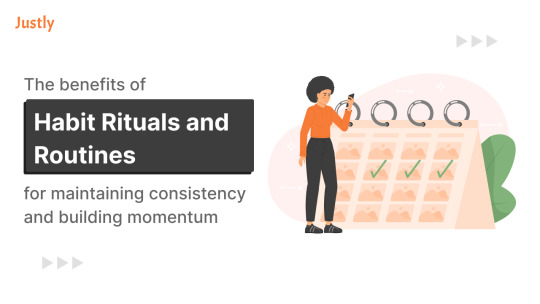
Do you ever find yourself setting ambitious goals, only to struggle with sticking to them?
Whether it’s exercising regularly, eating healthily, or learning a new skill, maintaining consistency is key to achieving success.
That’s where the power of habit rituals and routines come into play. By incorporating these into our daily lives, we can build momentum toward our goals and make consistent progress, even when faced with obstacles.
Introducing The Concept of Habit Rituals and Routines
Habit rituals and routines are like the secret sauce of success. They are the small actions and behaviors that we repeat consistently until they become automatic and ingrained in our daily lives.
Creating effective habit rituals and routines involves several steps, including—
Identifying your goals and values
Determining the habits or actions that will help you achieve those goals
Creating a structured sequence of actions that aligns with your goals and values
Starting small and gradually building up to more complex routines
Sticking with the routine long enough for it to become a habit
Practical tips for incorporating habit rituals and routines into daily life —
Start small— Begin with achievable routines, like drinking a glass of water upon waking.
Schedule— Make routines non-negotiable by adding them to your calendar or setting reminders.
Accountability— Share your routine with someone who can help keep you on track.
Adjustments— Be flexible and tweak your routine if needed.
Celebrate progress— Recognize and celebrate even the smallest achievements.
Incorporating habit rituals and routines into your daily life can significantly enhance your consistency and productivity. By establishing these practices, you can streamline your efforts and achieve your goals more effectively.
Remember that building positive habits and routines takes time and effort, but the rewards are well worth it.
If you're eager to delve deeper into mastering consistency through habit formation, be sure to visit our full article on Justly Blog.
#productivitytips#habits#growth#life#health & fitness#goals#blog#meditation#routine maintenance#best practices#spiritual practices
0 notes
Text
How To Use Creativity and Self-Expression to Build Confidence?
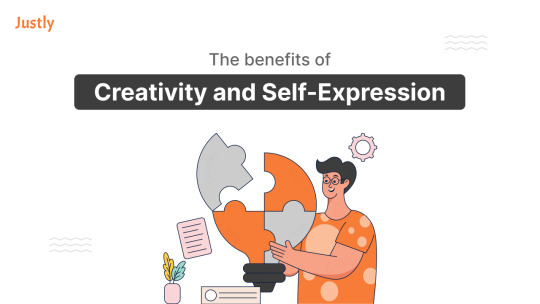
The topic of creativity and self-expression is essential for personal growth and mental health.
When we engage in creative activities such as writing, drawing, or dancing, we have the opportunity to explore our inner thoughts and emotions.
This process can be incredibly beneficial in overcoming self-criticism and building confidence.
Let’s explore some benefits of creativity and self-expression…
Creativity and self-expression have numerous benefits for personal growth and mental health.
They can help build confidence and self-esteem by increasing self-awareness and self-acceptance.
Creative expression can challenge negative self-talk and self-limiting beliefs, leading to increased self-compassion and self-acceptance.
Engaging in creative activities promotes personal growth and self-discovery.
Creating something can be therapeutic, providing a sense of control and accomplishment.
How to Use Creativity & Self-Expression as Tools For Overcoming Self-Criticism
Creativity and self-expression are effective tools for combating negative self-talk and self-limiting beliefs.
Engaging in creative activities such as Writing, Art, Music, and Dance can also be used to build confidence and self-esteem.
The Science of Creativity & Self-Expression
Scientific research has shown that engaging in creative activities has neurological and psychological benefits.
Neurological benefits
Creative expression can also activate different parts of the brain, such as the prefrontal cortex and the hippocampus, leading to increased cognitive flexibility and improved memory.
Psychological benefits
Creative expression has been found to have a positive impact on mental health and well-being.
Creative activities can reduce stress, anxiety, and depression, and improve self-esteem and self-efficiency.
Engaging in creative activities, we can tap into our inner creativity and express ourselves in new and exciting ways, leading to improved mental health and well-being.
It’s important to remember that self-acceptance and self-compassion are key components of the creative process.
So, If you're eager to delve deeper into this empowering process to build Self-Confidence, head over to Justly Blog.
Let your creativity be the key to unlocking your fullest potential.
0 notes
Text
How do Different Types of Meditation Can Affect Our Lives?

Meditation is the practice of focusing one’s mind for some period of time, noticing but not engaging with thoughts.
This can be done in silence or with the help of chanting and is done for several reasons, ranging from religious or spiritual purposes to a method for evoking relaxation.
Scientific evidence has also emerged that shows meditation can be a helpful tool in fighting chronic illnesses, including depression, heart disease, and chronic pain.
There are many different forms to practice meditation such as…
Mindfulness meditation involves being fully present and aware of one's surroundings without reacting to them.
Transcendental meditation involves repeating a mantra for 20 minutes twice a day to achieve relaxation and calmness.
Guided meditation uses mental imagery and senses to create a relaxing environment, often led by a guide or teacher.
Vipassana meditation focuses on self-observation and establishing a connection between mind and body.
Loving-kindness meditation directs well-wishes and warm-hearted feelings towards oneself and others.
Chakra meditation aims to bring balance and well-being to the body's energy centers through relaxation techniques.
Yoga meditation involves performing postures and controlled breathing exercises to promote flexibility and calm the mind.
So, are you ready to embark on a path that leads to inner bliss and a life filled with serenity?
Take a leap of faith and explore the wonders that meditation has in store for you.
To delve deeper into the impact of different ways of meditation practices, visit Justly Blog.
0 notes
Text
What are the benefits of having good sleep on your mind and body?
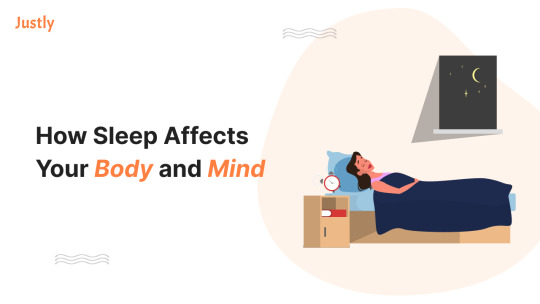
Did you know that getting enough sleep is crucial for both physical and mental health?
Yes! Sleep is vital to our health, but it’s often overlooked.
So Today, Let’s explore the latest research on sleep and its impact on our body and mind.
The Importance of Sleep
Sleep is crucial for overall well-being and functioning.
It plays a vital role in various aspects of our lives, from physical health to cognitive abilities and emotional stability.
Let’s discuss the significance of sleep…
Physical Health — It plays a vital role in physical health by allowing the body to repair and restore muscles, organs, and other systems.
Mental Health — Sleep is also important for mental health as it helps regulate emotions, improve concentration and memory, and lower the risk of depression and anxiety.
Age and Sleep — The amount of sleep needed varies based on age, with younger children needing more sleep and adults typically requiring 7-9 hours per night.
The Effects of Lack of Sleep
Lack of sleep, or sleep deprivation, can have significant effects on physical, mental, and emotional well-being.
It hampers cognitive abilities such as attention, concentration, and memory.
It can lead to reduced alertness and increased risk of accidents, both on the road and in the workplace.
It weakens the immune system, making individuals more susceptible to illnesses and impacting recovery.
Physical health issues such as obesity, diabetes, cardiovascular diseases, and certain types of cancer can be linked to sleep deprivation.
Mood disturbances, including irritability, mood swings, and increased stress.
It increases the risk of mental health disorders, such as depression and anxiety.
The Impact of Technology on Sleep
Screen Time — Blue light suppresses melatonin, and disrupts sleep.
Noise Pollution — Loud noises disturb sleep.
Social Media — Using before bed causes anxiety and sleep disruptions.
E-Reading — Adversely impacts sleep; paper books avoid eye strain.
Tips for Improving Quality of Sleep
Stick to a regular sleep schedule, even on weekends.
Create a sleep-conducive environment by keeping your bedroom cool & quiet.
Avoid caffeine, alcohol, and large meals before bedtime.
Unplug from technology and avoid screens at least an hour before bed.
Incorporate relaxation techniques like meditation or yoga into your bedtime routine.
If You Have an Excessive Sleep Disorder, Talk to Your Physician — You may have an underlying medical condition that needs treatment.
The benefits of good sleep extend far beyond just feeling rested.
From improved cognitive function to enhanced physical health, prioritising quality sleep positively impacts both mind and body.
For more in-depth insights and practical tips on optimising your sleep routine,
Read our full article on Justly Blog.
#life#habits#productivitytips#growth#health benifits#health & fitness#sleeping beauty#blog#tumblr milestone
0 notes
Text
Tips and Techniques For Getting More Done Within Lesser Time

Why should we manage our time well if we want to be successful?
Because, successful people know that everyone has the same amount of time in a day, and they waste no time ensuring things get done in a certain way.
Unlike money which we can earn it back, we cannot earn time back once it is lost.
Time Management
It is the process of planning and organizing your time effectively to maximize productivity and achieve desired goals.
Importance of Time Management
Time is the most precious commodity that we have.
If you are good at time management you will gain many benefits, such as —
The freedom to spend time with friends and family or doing activities that interest you
The freedom to work on special projects that interest you
The freedom to take classes that interest you
By learning time management, a person knows methods and skills to apply to their work and life.
Tips and Techniques for Getting More Done
Creating a to-do list helps keep track of your tasks and prevents forgetting important things.
Setting specific and measurable goals is crucial for effective time management.
Using a calendar helps schedule appointments and events, and prevents double-booking.
Prioritizing time by focusing on important tasks and learning to say no to unimportant things is essential.
Time-tracking tools can help manage time effectively and identify areas of time wastage.
Taking breaks, both short and longer ones, can increase productivity by recharging and refocusing.
There is a gap between who you are right now and who you want to be.
We have to learn to work smarter. The best way to do so is to give up unnecessary work, act faster, avoid overworking, and ask for help if needed.
So, Ready to make a change in your life?
Start implementing these time management tips and techniques today and see the difference they can make in your life.
These tips and techniques are just the beginning of your journey toward accomplishing more in less time.
For a deeper dive into maximizing productivity and achieving your goals, be sure to visit our full Article on Justly Blog.
0 notes
Text
How to Use Visualization to Achieve Your Goals

Have you ever wondered what Olympic athletes think about right before they compete?
They're in front of millions of people, feeling nervous and watching their competition. They consider what could go wrong and how to avoid it.
Sounds reasonable, right?
However, Experienced athletes avoid visualizing mistakes before competing.
Why?
Because imagining mistakes increases the chance of actually making them during the event. Instead, top athletes are trained to visualize their goals before competing.
This is the power of visualization — and you, too, can use this technique every day to help you achieve your goals and dreams.
What Is Visualization?
Visualization is a simple technique that you can use to create a strong mental image of a future event.
With good use of visualization, you can practice in advance for the event, so that you can prepare properly for it.
And by visualizing success, you can build the self-confidence you need to perform well.
Visualization offers several benefits
It boosts confidence by allowing you to envision achieving your desired outcomes.
It acts as practice for success, preparing your mind and body for real-life actions.
Anyone can use visualization to reach their goals, regardless of their background or expertise.
How to Use Visualization to Achieve Your Goals
Follow these steps to start visualizing your goals.
Decide What You Want — Choose a dream or goal to focus on. For instance, imagine a successful presentation you have to give next week.
Picture the Scene — Imagine the details vividly. What do you see, hear, smell, taste, and feel?
For example, see yourself in front of your team, notice their faces and surroundings, and feel confident about your presentation.
Imagine Each Step Toward Your Success — Visualize each step of your presentation, from the introduction to the conclusion.
Focus on positive feelings and avoid negative ones.
Visualize Daily — Do a complete visualization once a day until your presentation.
Consistent visualization convinces your brain that your vision is real, increasing the likelihood of success.
You can do this anywhere, anytime.
Incorporating visualization and goal setting can be transformative in maintaining consistency on your journey toward success.
By harnessing these powerful practices you can pave the way for achieving your dreams with purpose and determination.
For more insights and practical tips on how to apply these strategies effectively, delve into the full Article on Justly Blog.
0 notes
Text
How To Cultivate a Habit of Positive Self-talk?
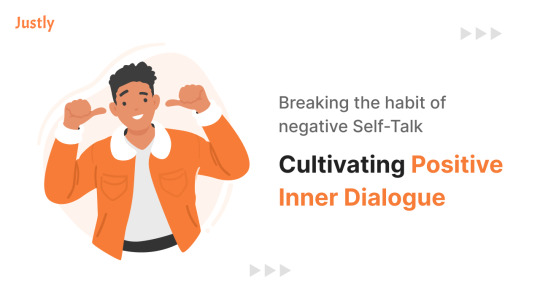
Do you ever catch yourself having full-on arguments with your own thoughts?
Paying attention to your daily self-talk reveals the challenge of avoiding negative inner dialogue.
So, Let's explore some ways to stop that inner critic in its tracks when it’s being less than helpful.
What is Negative Self-Talk?
Negative self-talk is the habit of having critical, pessimistic, and self-defeating thoughts about oneself, marked by harsh self-judgment, self-doubt, and self-criticism.
Here are some examples of negative self-talk
Catastrophizing —Worst-case thinking and dwelling on negatives.
Overgeneralization — Making broad negative conclusions from limited events.
Personalization — Blaming yourself for things beyond your control.
Filtering — Ignoring the good and focusing only on the bad.
Comparisons — Constantly comparing yourself to others, feeling inferior.
Labeling — Using negative labels to describe yourself, believing them.
How to Cultivate Positive Inner Dialogue
Cultivating a positive inner dialogue involves intentionally shifting your thoughts and self-talk toward more positive and supportive messages.
Here are some strategies to help you cultivate a positive inner dialogue…
Reframe negative thoughts — Replace negative thoughts with positive or realistic alternatives, seeking kinder and empowering perspectives.
For instance, shift from saying "I'm a failure" to "I faced a setback, but can learn and grow from this experience."
Use positive affirmations — Reinforce self-belief with positive statements like "I am capable and deserving of success" or "I embrace my uniqueness and value myself.
Gratitude practice — Cultivate gratitude through regular reflection on things you appreciate, shifting focus to positivity, and counterbalancing negative thoughts.
Seek support — Seek support from friends, family, or a network when dealing with negative self-talk for perspective, encouragement, and validation.
Practice mindfulness and meditation — It can help you observe thoughts without judgment, increasing self-awareness for consciously choosing positive and constructive thoughts.
Patience and Consistency — Developing a positive inner dialogue requires patience, consistency, and gradual practice, as overnight changes are unlikely.
Embrace your unique quirks and imperfections, they shape the wonderful individual that you are.
Life is too short to be at odds with your mind; instead, let the power of positive self-talk be your guide to self-acceptance and growth.
If you're ready to embark on this transformative path, head over to the Justly Blog.
0 notes
Text
How Minimalism Can Simplify Your Life For Greater Fulfillment?

Habits are powerful! Although it’s not always simple to develop good habits, it’s worth it in the long run.
That’s why today, I want to share minimalist habits that can transform your life.
I know, because they changed my life and my family’s life for the better.
What is Minimalism?
A philosophy and lifestyle that seeks to simplify and declutter our lives, allowing us to focus on what truly matters.
At its core, minimalism is about intentionally choosing to live with less, stripping away the excess and unnecessary to create space for what brings us joy, purpose, and fulfillment.
Simplifying Your Life for Greater Fulfilment
Ignore the haters — Don't let criticism or negativity from others bring you down.
Focus on doing what makes you happy and live your life on your own terms.
Follow the one-in, one-out rule — For every new item you bring into your home, get rid of an old item.
This helps maintain balance and prevents clutter from accumulating.
Embrace space — Minimalism is about appreciating the beauty of space.
Don't feel the need to fill every corner with stuff. Enjoy the feeling of openness and simplicity.
Create a budget — Tracking expenses and sticking to a budget is important for financial well-being.
Minimalism and frugal living go hand in hand.
Say no to free stuff — Don't clutter your home with freebies you don't need or want.
Learn to say no if it doesn't align with your needs.
Turn off notifications — Notifications can be distracting and disrupt your focus.
Silence your phone or turn off notifications when you need to concentrate or relax.
Share the responsibility — If you live with others, divide household chores and encourage everyone to contribute.
Teaching responsibility builds character and creates a happier home.
Be sustainable — When decluttering, consider reselling, donating, giving away, or recycling unwanted items instead of throwing them away.
Sustainability is important for both you and the environment.
Drive less — Whenever possible, choose walking, cycling, or public transportation instead of driving.
It's better for the environment and can improve your health.
Let go — Release mental and emotional clutter that drains your time, space, and energy.
Prioritize what truly matters and let go of fear, toxic relationships, bad money habits, and guilt.
Minimalism is a lifelong journey that involves simplifying, decluttering, and creating space for greater fulfillment.
It's about progress, not perfection, and finding what works best for you.
Embracing minimalism can truly transform your life, paving the way for greater fulfillment and simplicity.
If you're intrigued by the idea of streamlining your life and unlocking a new level of contentment, dive deeper into our full Article on Justly Blog.
0 notes
Text
How To Increase Productivity With Time Management Techniques

What is Time Management?
Time management is the process of planning and organizing how you allocate your time to specific tasks, activities, or goals to maximize productivity and efficiency.
Benefits of Time Management
Time management offers numerous benefits across various aspects of life, including personal, professional, and academic areas.
So, let’s discuss some key benefits of time management…
Increased productivity
Improved focus and concentration
Better work-life balance
Goal achievement
Increased self-discipline
Career Advancement
Financial benefits
Time management is a valuable skill that can have a profound impact on various aspects of your life.
It empowers you to make the most of your time and achieve your goals.
Time Management Techniques for Increased Productivity
Effective time management techniques can significantly increase productivity by helping you make better use of your available time.
Eliminating distractions, such as turning off notifications and creating a distraction-free environment, can improve focus.
Learning to say no to requests or commitments that don't align with your priorities prevents overcommitment.
Utilizing technology tools like calendar apps, task management apps, and project management software can help organize and track tasks and schedules.
Time-tracking apps or methods like time logs can provide insights into time-wasting habits and areas for optimization.
Setting clear boundaries for personal and professional life helps protect time and prevent over-commitment.
Taking short breaks and prioritising self-care activities like exercise and hobbies can recharge and maintain overall well-being.
Batch processing emails during specific times of the day prevents interruptions and allows for more focused work.
The key is to experiment with them, observe the results, and refine your approach over time to achieve the best time management strategy for your needs.
Mastering effective time management techniques is the key to unlocking greater productivity in your daily life.
The insights shared in this blog only scratch the surface of the transformative power these strategies can bring.
For a deeper dive into practical tips and personalized approaches, be sure to explore the full Article on Justly Blog.
0 notes